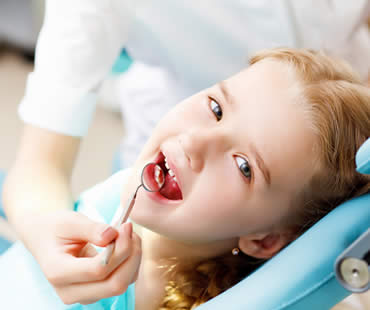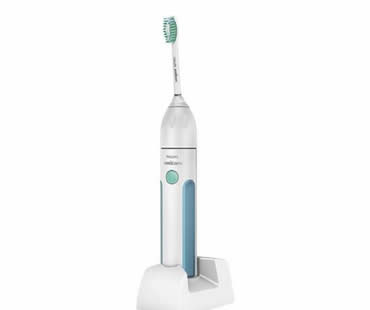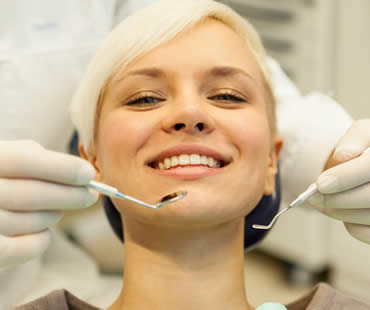
General dentistry offers exactly what the name implies: dental care related to the general maintenance of good oral health. The ideal way to look at dentistry is preventative, which means focusing on good oral hygiene and functionality before problems can take hold. Finding a qualified and skilled general dentist who you visit every six months for checkups is the best way to prevent serious dental issues and help you maintain excellent oral health.
A trip to the general dentist for you or any of your family members, no matter their age, is a smart way to keep your smile looking and feeling great. Your general dentist will help create the perfect dental plan that depends on your personal oral health and needs. A typical dental visit includes thorough examination, X-rays or other diagnostic tests, professional teeth cleaning, and any treatments that might be needed for your condition. If a certain treatment isn’t available through your general dentist, it’s likely that you’ll receive a referral to a reputable specialist to complete the work.
Every dentist is unique, so you’ll need to inquire about the specific treatments available at your dentist’s practice. Some common services that many general dentists provide include:
- Dental sealants
- Fluoride treatments
- Professional cleanings
- Gum scaling or recontouring
- Fillings
- Bonding
- Root canal therapy
- Crowns and bridges
- Dental implants
- Dentures
- Veneers
- Orthodontics
In addition to dental treatments, your general dentist will evaluate your at-home hygiene routine and make suggestions for improvement. You will learn proper brushing and flossing techniques, as well as learn about any additional products or practices that might improve your oral health. Your general dentist wants you and your family to have the best smiles and oral health possible, and will help you achieve that goal.
Schedule your appointment at our Sicklerville dental office

If you have severely damaged, diseased or injured teeth, your dentist may recommend crown and bridge treatment. A crown is a dental restoration that fully covers a tooth and becomes the tooth’s new outer surface. A bridge is also a dental restoration that is anchored to natural teeth. However, a bridge replaces and fills the gap left by multiple missing teeth. Both crowns and bridges are made from a variety of materials and can be matched to the color of your natural teeth. Unlike removable dental devices like dentures, crowns and bridges are permanently affixed to existing teeth or implants allowing them to look and function similarly to natural teeth.
In addition to restored function and appearance, crowns and bridges offer a host of additional benefits including:
- Dental crowns protect and strengthen the natural tooth, helping you to avoid extraction.
- Crowns are the final step in root canal treatment, protecting the tooth from bacteria that could re-infect the treated tooth.
- Crowns and bridges restore missing teeth and support the remaining teeth.
- Your natural bite is restored and maintained with crown and bridge treatment.
- Placement of crowns and bridges improve your speech, smile and chewing function.
- Adjacent teeth are prevented from shifting and tilting with crown and bridge treatment.
- Crowns and bridges are long-lasting, predictable and durable.
- Placement of crowns and bridges is quick and can usually be completed in as little as two appointments.
- Alternatives to crown and bridgework, like dental implants, are usually more invasive requiring surgery and possibly bone grafting to place the implant.
Consult with your dentist to find out more about the advantages of crowns and bridges and how they can help to restore your healthy smile.
We look forward to seeing you in our Sicklerville dental office

Finding the right dentist is an important decision because it’s a healthcare relationship that can last a lifetime. The need for dental care starts around age one and continues through senior adulthood. For routine dental care, you might choose to see a family dentist or a general dentist. Although there are some similarities, the two types of dentists have some unique aspects.
Services:
Both types of dentists offer routine services that are common to oral health care. This includes examinations, cleanings, x-rays, and fluoride treatments. Instructing patients about dental hygiene such as proper brushing and flossing is part of most family and general dentistry practices as well. Poor oral care can cause decay, infections, gum disease, or other problems. Both types of dentists also offer treatment for when problems arise, such as dental fillings.
Patients:
General dentists often cater to patients in a certain age range, but family dentists provide treatment for patients of all ages. Infants, children, adolescents, adults, and seniors are all able to seek oral health care from a family dentist. Each age group has unique needs and issues, but family dentists are skilled in caring for everyone.
Specializations:
Since they see all ages of patients, family dentists are skilled in a wide variety of procedures. They are able to diagnose and treat many oral health conditions, including gum disease and oral cancer. Typical procedures they offer include tooth extractions, root canals, fillings, crowns, bridges, and sealants. Some are able to perform specialty services like implants and veneers. Many patients enjoy being able to obtain treatment from their family dentist without having to see a specialist.
Benefits:
In addition to the benefit of getting a variety of treatments in one location, family dentists are also able to provide ongoing treatment for all household members. Children and parents go to the same location and can even request back-to-back appointments. Everyone learns the same dental care techniques that they can practice at home together. Family dentists encourage every member of the family to take pride in their oral health.
If you live in the Sicklerville area contact us today

Dentists say that electric toothbrushes really can make a difference in your ability to clean your teeth and gums. However, not all models provide the same amount of benefits. There are some important things to know about making your choice so that you purchase the best toothbrush for your needs. Here are some guidelines to consider when selecting an electric toothbrush.
Toothbrush heads
If several people will be using the toothbrush, look for one with assorted head sizes. Adults and children need different sizes of heads for the best results. Also, make sure you choose a model with replaceable toothbrush heads. This will save you money in the long run because you’re only discarding old heads, instead of throwing away entire electric toothbrushes.
Batteries
Your electric toothbrush needs a rechargeable battery so that you’re not investing money in new batteries all the time. Also, your fully charged toothbrush should last over a week. You shouldn’t have to charge the toothbrush all the time, just like you shouldn’t have to with other electric items like your laptop.
Spinning
Some electric toothbrushes offer a special type of head that spins all the way around, which allows you to clean areas that other brushes have a hard time reaching. A spinning brush may cost a bit more, but it really does a great job of helping to fight plaque and prevent gum disease.
Warranty
Look for a toothbrush with a warranty, especially when you’re buying an expensive model. That way if something unexpected happens, it might be covered under the warranty instead of having to purchase a whole new brush.
General and family dentist in Sicklerville

You might think that the point of going to your general dentist is for cleanings and maybe an occasional filling. But you are wrong if you believe that’s all your dentist can offer you! A wide variety of treatments is available at a typical general dentist’s office.
Most visits to your general dentist include an initial consultation, thorough examination, and diagnostic tests if needed like dental x-rays. You’ll have the opportunity to express any problems or concerns you have, and your dentist will identify any issues that you might not be aware you have. You can also expect a meticulous professional cleaning to eliminate tartar buildup and stains that you may not have been able to get rid of at home.
You can expect these common procedures at many general dentistry practices:
- Fillings – to repair damage caused by tooth decay, often using composite resin material to provide a strong yet cosmetically appealing solution.
- Bonding – using composite resin to repair issues like cracks, chips, gaps or stains.
- Crowns – also called caps, these restorations are fitted over damaged or broken teeth to restore tooth structure and function, and to protect them from future damage.
- Bridges – to replace missing teeth, a bridge structure anchors an artificial tooth or teeth. Crowns fit over natural teeth on both sides of a gap, in which the artificial tooth replaces a missing tooth to provide a natural appearance and functional replacement.
- Dentures – if a number of teeth are missing, dentures are removable false teeth with the goal of functioning and looking like real teeth.
- Root canal treatment – when the interior pulp of a tooth is badly damaged or infected, this procedure removes the faulty portion and completely restores the tooth to avoid tooth loss.
- Teeth whitening – when teeth have become discolored with age, tobacco use, diet, or more, it can be very difficult to restore their white shade without the aid of professional whitening. General dentists may offer at-home kits or in-office whitening treatments.
- Maxillofacial treatments – mouth, jaw, or facial procedures are sometimes offered, including options like TMJ treatment or dental implants.
If you need a dentist in Sicklerville contact us today

Using mouthwash is not a replacement for brushing and flossing, but instead is an addition to your oral care routine that can help you maintain healthy teeth and gums. If you’ve visited the mouthwash aisle at your local drugstore lately, you’ve seen that there is a giant selection of brands and types to choose from. It can be a bit overwhelming if you don’t know what purpose each one serves. Here is a description of the most common types of mouthwashes to help you choose.
Antiseptic
The goal of antiseptic mouthwash is to kill germs and bacteria in your mouth. It can also combat gum disease and persistent bad breath. Most dentists recommend that you discuss using antiseptic mouthwash with them before selecting this type, because they can help you decide if it’s needed for you. It can impact your sense of taste and can stain your teeth, so you want to be sure it’s helpful for you before using it.
Fluoride
The most common kind of mouthwash is fluoride, which utilizes the natural abilities of this mineral to strengthen your tooth enamel and prevent tooth decay and cavities.
Cosmetic
Designed to disguise bad breath, or halitosis, cosmetic mouthwash does not offer protection from problems like tooth decay. It can help keep your teeth clean and help rinse away food particles, but it is mainly for freshening your breath.
Combination
Mouthwash that combines purposes of the product is called combination mouthwash. It is meant to prevent tooth decay, maintain your oral health, and freshen your breath.
Prescription
Sometimes a prescription mouthwash is warranted for patients with gum disease or other types of decay. See your dentist to find out it this type of mouthwash would benefit you.
If you live in the Sicklerville area and you need a general dentist, contact us today.












